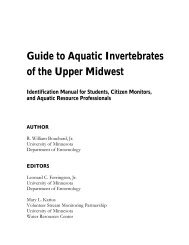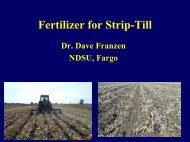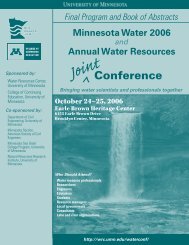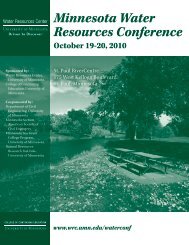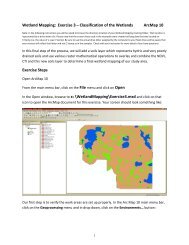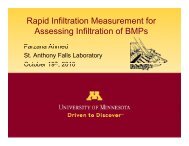Minnesota Water Resources Conference - Water Resources Center ...
Minnesota Water Resources Conference - Water Resources Center ...
Minnesota Water Resources Conference - Water Resources Center ...
You also want an ePaper? Increase the reach of your titles
YUMPU automatically turns print PDFs into web optimized ePapers that Google loves.
Program Schedule – Monday, October 27, 2008 (continued)<br />
3:15 – 4:45 Concurrent Sessions III<br />
Track A Ballrooms CD Track B Meeting Rooms 1–3 Track C Meeting Rooms 7–9 Track D Meeting Rooms 4–6<br />
Low Impact<br />
Development<br />
Moderator: Wayne Sicora<br />
Co-moderator: Lorin Hatch<br />
Amery Regional Medical<br />
<strong>Center</strong> – A Rural LID<br />
Precedent<br />
Kevin Biehn, Emmons &<br />
Olivier <strong>Resources</strong>, Inc.<br />
Low Impact Storm <strong>Water</strong><br />
Management – Lessons<br />
Learned<br />
Jessica Collin-Pilarski, Daniel<br />
Bigalke, Ayres Associates<br />
Vegetation – Can It Fix Soils<br />
in Raingardens Not in Your<br />
Lifetime!<br />
Dave Bauer, Rice Creek<br />
<strong>Water</strong>shed District, and<br />
Dan Wheeler, University of<br />
<strong>Minnesota</strong><br />
Pesticides,<br />
Contaminants of<br />
Concern, and Emerging<br />
Contaminants<br />
Moderator: Mark Edlund<br />
Co-Moderator: John Baker<br />
Fermentation Processes:<br />
Effect on Contaminant<br />
Partitioning and <strong>Water</strong><br />
Quality<br />
Denice Nelson and Paige<br />
Novak, University of<br />
<strong>Minnesota</strong><br />
Identification and<br />
Degradation of Industrial<br />
Phytoestrogens<br />
Mark Lundgren and Paige<br />
Novak, University of<br />
<strong>Minnesota</strong><br />
A 2007 Assessment of<br />
Pesticides in <strong>Minnesota</strong><br />
Lakes<br />
William VanRyswyk,<br />
<strong>Minnesota</strong> Department of<br />
Agriculture, and Steven<br />
Heiskary, <strong>Minnesota</strong><br />
Pollution Control Agency<br />
Hydrologic Impacts<br />
of Climate Change<br />
Moderator: Rick Voigt<br />
Co-Moderator: Randy Neprash<br />
Adapting Storm <strong>Water</strong><br />
Management to Climate<br />
Change<br />
Jennifer Olson and Camilla<br />
Correll, Emmons & Olivier<br />
<strong>Resources</strong>, Inc.<br />
Devils Lake: Hydrologic<br />
Analysis of a Closed<br />
Basin System<br />
Kari Layman and Rick Hauck,<br />
U.S. Army Corps of Engineers<br />
Influence of Climate Change<br />
on Flow in the <strong>Minnesota</strong><br />
River at Mankato<br />
Jeramy Kulesa and David<br />
Mulla, University of<br />
<strong>Minnesota</strong><br />
Sediment Loading<br />
Moderator: Jon Hendrickson<br />
Co-Moderator: Karen Jensen<br />
Sediment Loading in<br />
the Le Sueur River Basin<br />
Stephanie Day and Patrick<br />
Belmont, University of<br />
<strong>Minnesota</strong>; Karen Gran and<br />
Andrea Johnson, University of<br />
<strong>Minnesota</strong>, Duluth; and<br />
Carrie Jennings, <strong>Minnesota</strong><br />
Geological Survey<br />
Wild Rice River<br />
Sediment Budget<br />
Jonathan Petersen, Jon<br />
Hendrickson, and Rebecca<br />
Soileau, U.S. Army Corps<br />
of Engineers<br />
Quantifying Erosion Rates<br />
from Ravines, Streambanks,<br />
and Bluffs<br />
John Nieber, Brad Hansen,<br />
Chris Lenhart, Jason Ulrich,<br />
Geoff Kramer, Zusana Kunesova,<br />
David Mulla, Shannon<br />
Wing, and Joel Nelson, University<br />
of <strong>Minnesota</strong><br />
4:45 – 5:45 Poster Session and Reception<br />
<strong>Minnesota</strong> Section, American Society of Civil Engineers (ASCE), Meeting<br />
Monday, October 27, 2008 – 6 p.m. Social Hour, 7 p.m. Dinner, 8 p.m. Program<br />
Location: Mancini’s Char House and Lounge, 531 West Seventh Street, Saint Paul, <strong>Minnesota</strong><br />
Cost: $30. This meeting is open to anyone who is interested.<br />
The Rain Falls, the Rain Runs Off. Should I Be Concerned<br />
Speaker: John S. Gulliver, Joseph T. and Rose S. Ling Professor, Department of Civil Engineering, University of <strong>Minnesota</strong><br />
As civil engineers, we should be concerned about storm water runoff because it is a significant portion of any civil engineering project and a<br />
large portion of maintenance requirements. For example, handling storm water runoff constitutes five percent of highway construction projects<br />
on average, and the maintenance of these storm water facilities can be up to 10 percent of their initial construction cost every year. In<br />
addition, a good design can reduce construction costs by up to 50 percent, reduce maintenance costs by up to 50 percent, and sometimes do both!<br />
So, transportation, geotechnical, structural, and construction professionals, take note: Regulations for storm water handling can create<br />
substantial opportunities for cost savings; innovations with the use of the water can also create an improved human environment, and<br />
should be a part of your initial construction planning process.<br />
This talk will address the construction process with innovative storm water planning. The result is the merging of landscape and<br />
infrastructure to provide for improved water quality, reduced water runoff quantity, and an improved environment.<br />
For questions or additional registration information, contact Teresa Kes, Barr Engineering (tkes@barr.com), or John F. Blackstone, PE<br />
(jblackstone@comcast.net or 651-266-6324).<br />
Reservations can be made online at www.ascemn.org or through voice mail at 952-832-2929.<br />
7 <strong>Minnesota</strong> <strong>Water</strong> <strong>Resources</strong> <strong>Conference</strong>, October 27–28, 2008




